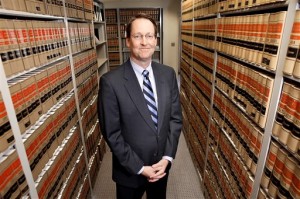Judge, expert spar during Wis. abortion trial (UPDATE)
By: Associated Press//May 29, 2014//
By TODD RICHMOND
Associated Press

MADISON, Wis. (AP) — An unusual courtroom discussion between doctors in a federal trial to determine if Wisconsin’s requirement that abortion providers have hospital admitting privileges can stand got off to a rocky start Thursday with the judge sparring verbally with one expert.
U.S. District Judge William Conley pressed Dr. John Thorp, a University of North Carolina obstetrician whom state attorneys called to help defend the law, to quantify abortion risk rates. Thorp resisted, saying complications are under-reported and no U.S. studies on maternal deaths from abortion are reliable.
Conley then quipped the discussion reminded him of the quote popularized by author Mark Twain that there are lies, damn lies and statistics. Thorp, a member of the American Association of Pro-Life Obstetricians and Gynecologists, told Conley that he felt “chilled” by the idea that a federal judge thought he was lying. Conley responded that he didn’t mean to imply that.
Wisconsin is one of a handful of states that recently passed laws requiring doctors to have hospital admitting privileges. Abortion clinics in Alabama have filed a lawsuit similar to the one in Wisconsin.
Conley was in the third day of a bench trial to gather evidence on whether the requirement is constitutional. Planned Parenthood and Affiliated Medical Services filed a lawsuit last summer contending the mandate will force AMS’s clinic to close because providers there lack admitting privileges, forcing women to travel further for abortions and placing an undue burden on them.
The law’s supporters counter the requirement will ensure better continuity of care if women who suffer complications from an abortion are hospitalized.
Conley isn’t expected to rule for weeks. It’s likely that any decision he makes will be appealed to the 7th Circuit Court of Appeals. That court advised Conley last year to take the rare step of calling his own expert to testify since both sides’ witnesses might be biased.
Accordingly, Conley set up a discussion Thursday between Thorp, the plantiffs’ expert, Dr. Douglas Laube, a University of Wisocnsin-Madison obstetrician who serves as president of the American College of Obstetricians and Gynecologists, and his own expert, Dr. Serdar Bulun, chairman of Northwestern University’s gynecology department.

Conley began by asking the trio if they agreed abortion was a fairly safe procedure. They all agreed it was relatively safe, but Thorp insisted complications are under-reported and no study offers reliable statistics on mortality. Conley was skeptical, triggering the exchange over the quote.
Laube chimed in that all studies are open to criticism but medicine wouldn’t advance if doctors didn’t rely on them.
Conley later asked the trio if an abortion patient would be better off being treated by a provider with admitting privileges than without.
Both Bulun and Laube said they believe transfer agreements between clinics and hospitals provide better care for abortion patients than hospital admitting privileges. Such agreements call for abortion clinics to send patients with complications to specific hospitals. Laube said those agreements ensure the most qualified doctor at the hospital would take over the case.
Thorp countered that transfer agreements amount to sending the patient off to a “black box” and don’t help if a woman develops complications after leaving the abortion clinic.
He also said the admitting privileges requirement would help immerse abortion providers in the hospital culture and provide a way to punish doctors for faulty care because those privileges could be revoked.
“I reject the final premise,” Thorp said, “that a law like this will harm Wisconsin women.”
Legal News
- History made in Trump New York trial opening statements
- Prosecutor won’t bring charges against Wisconsin lawmaker over fundraising scheme
- Republican Wisconsin Senate candidate says he doesn’t oppose elderly people voting
- Vice President Harris to reveal final rules mandating minimum standards for nursing home staffing
- Election workers fear threats to their safety as November nears
- Former law enforcement praise state’s response brief in Steven Avery case
- Eric Toney announces re-election bid for Fond du Lac County District Attorney
- Former Wisconsin Democratic Rep. Peter Barca announces new bid for Congress
- Republicans file lawsuit challenging Evers’s partial vetoes to literacy bill
- More human remains believed those of missing woman wash up on Milwaukee Co. beach
- Vice President Harris returning to Wisconsin for third visit this year
- Wisconsin joins Feds, dozens of states to hold airlines accountable for bad behavior
WLJ People
- Power 30 Personal Injury Attorneys – Russell Nicolet
- Power 30 Personal Injury Attorneys – Benjamin Nicolet
- Power 30 Personal Injury Attorneys – Dustin T. Woehl
- Power 30 Personal Injury Attorneys – Katherine Metzger
- Power 30 Personal Injury Attorneys – Joseph Ryan
- Power 30 Personal Injury Attorneys – James M. Ryan
- Power 30 Personal Injury Attorneys – Dana Wachs
- Power 30 Personal Injury Attorneys – Mark L. Thomsen
- Power 30 Personal Injury Attorneys – Matthew Lein
- Power 30 Personal Injury Attorneys – Jeffrey A. Pitman
- Power 30 Personal Injury Attorneys – William Pemberton
- Power 30 Personal Injury Attorneys – Howard S. Sicula











